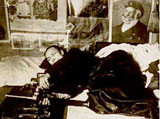The Harrison Narcotics Act
The first federal drug law, the Harrison Narcotics Act, is passed in 1914. It is considered by some to be the first legal move in what will become known as the Drug War. By heavily taxing and regulating opiates and cocaine, this act aims to stem the trafficking of these drugs into the U.S. The Harrison law originates with the country's desire to improve trade relations with China. That country is in the midst of widespread addiction, which they are attempting to counter with a very stringent anti-opium stance. Washington thinks that if America assumes that same position, the alliance between the two countries will strengthen.
Notably, Harrison's scope includes "coca leaves" and their derivatives, thereby relegating these substances to the same disreputable status as morphine and opium for the first time. Cocaine has been added to the bill to gain the support of white Southerners, who have long wanted to outlaw the stimulant‹many believe its use makes African Americans resistant to bullets.
Meanwhile, anxiety over opium dens on the West Coast increases, and anti-Chinese sentiment rages. The two issues are seen as one, and the Chinese bear the brunt of the anti-opium crusade. Morphine use has come to be associated with the poor and derelict. Though international politics are behind the Harrison act, it fits well with national sympathies, too. Drugs are now seen as destructive, undesirable, and problematic, and their relationship to crime and the underclass is established during this era.
 |
| Chinese Opium Den, California, c. 1930 |